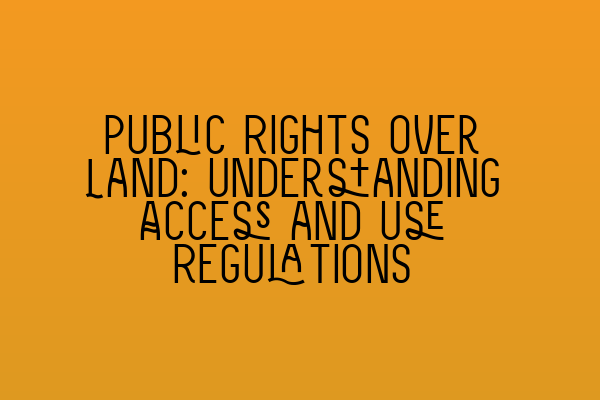Public Rights Over Land: Understanding Access and Use Regulations
Welcome to the SQE Property Law & Land Law blog, where we dive into the intricacies of property law and provide valuable insights to help you navigate through legal challenges. In this article, we will be discussing an important aspect of property law: public rights over land and the regulations surrounding access and use.
Public rights over land refer to the legal entitlements individuals or groups have to access and utilize certain areas of land that are considered public or subject to specific regulations. These rights are crucial for ensuring fair and equitable use of land resources, while also protecting the rights of landowners.
Understanding the different types of public rights over land is essential for both landowners and individuals seeking access. Let’s explore some common public rights and the regulations surrounding them.
1. Public Footpaths and Rights of Way:
Public footpaths are designated paths that grant public access to specific areas. These paths can include rights of way, which provide a legal right to pass through private land. Public rights of way can be found across rural and urban areas and are often marked by signs or footpath symbols.
When using public footpaths and rights of way, it is important to respect the landowner’s property and follow any specific rules or restrictions in place. This ensures a harmonious relationship between the public and private landowners.
2. Common Land:
Common land is another category of public rights over land. It refers to areas of land that are owned by one or more individuals but are subject to certain shared rights by the public. These rights may include the right to graze livestock, gather firewood, or participate in recreational activities.
Common land is typically regulated through local bylaws and may have restrictions on certain activities to maintain the land’s ecological balance and protect its natural resources. Understanding these regulations is vital to avoid any potential legal issues.
3. Access to Waterways:
Public rights over waterways, such as rivers and lakes, are crucial for ensuring that everyone has reasonable access to these resources. The regulations surrounding access to waterways focus on maintaining public safety, protecting the environment, and preserving the rights of riparian landowners.
In most cases, individuals have the right to navigate or walk alongside navigable rivers and lakes, but it’s important to be aware of any specific restrictions or regulations imposed by local authorities or landowners.
4. Public Open Spaces:
Public open spaces, such as parks, gardens, and recreational areas, provide opportunities for the public to enjoy outdoor activities and connect with nature. These spaces are typically owned or managed by local authorities or government entities.
While public open spaces are accessible to the public, there may be regulations in place to protect the environment, preserve historical or cultural heritage, and ensure the safety and enjoyment of all users. Familiarizing yourself with any applicable regulations will help ensure compliance.
As a landowner, it is important to be aware of the various public rights over your land and understand the legal obligations that come with them. By understanding these rights and regulations, you can effectively manage your property and mitigate any potential disputes.
For individuals seeking access to public rights over land, it is equally important to be respectful of landowners’ rights and responsibly engage in activities that are permitted under the applicable regulations.
At SQE Property Law & Land Law, we offer comprehensive legal services to help you navigate the complexities of property law. Whether you require assistance with property transactions, disputes, or regulatory compliance, our team of experienced solicitors is here to support you.
If you’re preparing for the SQE exams, we also offer preparation courses and practice materials to help you succeed. Check out our related articles for more information on SQE exam preparation and important exam dates:
– SQE 1 Practice Exam Questions
– SQE 1 Practice Mocks FLK1 FLK2
– SQE 2 Preparation Courses
– SQE 1 Preparation Courses
– SRA SQE Exam Dates
Remember, understanding public rights over land is crucial for both landowners and individuals seeking access. By staying informed and complying with regulations, we can maintain a balanced and fair system that benefits everyone.
Feel free to reach out to us at SQE Property Law & Land Law if you have any questions or require legal assistance. We are here to help you navigate the intricacies of property law and ensure your rights are protected.
